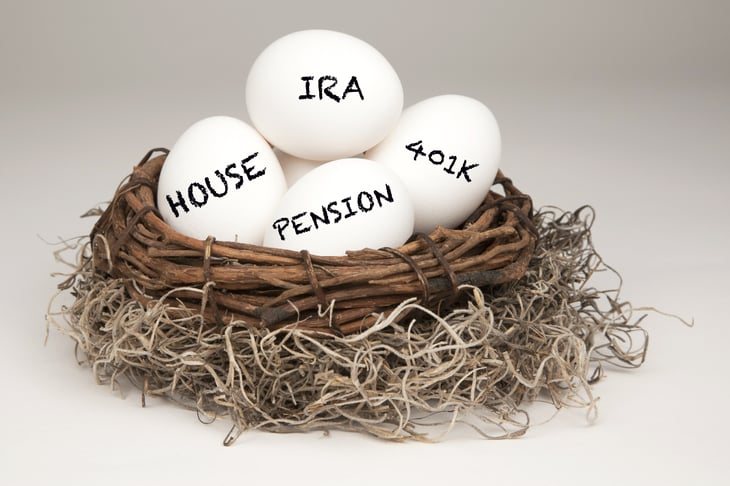
In the years leading up to retirement, we all make countless decisions that have a major impact on how prepared we are for our golden years.
Once we stop working and look back, some decisions might appear especially helpful — or conversely, harmful — to our retirement readiness.
Recently, the Nationwide Retirement Institute surveyed 1,000 U.S. consumers ages 60 to 65 — including both retirees and pre-retirees — and asked them for their opinion about how significantly specific life decisions impacted their financial readiness for retirement.
Here are the decisions respondents said most harmed their retirement readiness, followed by those decisions that most improved it.
5. Made extravagant purchases

Share of respondents who did this and said it harmed their retirement readiness: 51%
Wasting money by purchasing things you don’t need leaves you with less cash to save and invest.
That doesn’t mean you should never splurge on fun things. But every time you pamper yourself with something fun today, you are leaving yourself a little less prepared for your future retirement.
So try to keep your purchases sensible. For example, instead of buying a fancy, expensive new car, purchase a more affordable used car with a reputation for reliability.
4. Took a loan from 401(k)

Share of respondents who did this and said it harmed their retirement readiness: 56%
Perhaps there are emergency situations when it makes sense to take a loan from your 401(k) account. But most experts advise against using these types of loans unless it is absolutely necessary.
When you borrow from your 401(k) account, you prevent thousands of dollars from compounding until you pay back the loan. That has a negative impact on your ability to grow wealth as evidenced by the fact that more than half of those who have taken such loans say it harmed their retirement readiness.
3. Waited until after 30 to start saving for retirement

Share of respondents who did this and said it harmed their retirement readiness: 69%
The longer you wait to begin saving for retirement, the less time your money has to compound. This can dramatically decrease the amount of money you will have in your nest egg when retirement rolls around.
Want a clear example of the danger of waiting too long to begin saving? You will find it in “The 10 Golden Rules of Retiring Rich.”
2. Tapped retirement savings early

Share of respondents who did this and said it harmed their retirement readiness: 71%
Another big mistake is tapping your retirement savings early. Generally, if you start taking money from tax-advantaged retirement accounts before the age of 59 1/2, you will owe both taxes and penalties on your withdrawals.
In addition, the money that you tap early and spend is gone forever. That means it will not continue to compound for you — and your retirement — in the years and decades ahead.
1. Made bad investments that led to significant financial loss

Share of respondents who did this and said it harmed their retirement readiness: 85%
Virtually all of us have made a boneheaded and costly financial mistake or two that has damaged our financial fitness.
A huge percentage of survey respondents say they made bad investments that resulted in losses and undermined their retirement readiness.
So before you start to invest, make sure to to listen to Money Talks News founder Stacy Johnson’s podcast “15 Habits of Highly Successful Investors.”
Actions that improved retirement readiness the most

In addition to recounting the mistakes that undermined retirement readiness, survey respondents highlighted the actions they took that boosted their retirement readiness. They are as follows.
1. Worked with a financial pro to make a retirement plan

Share of respondents who did this and said it improved their retirement readiness: 86%
Few people really have a knack for — or interest in — taking a DIY approach to retirement planning. For such folks, the help of a professional can be priceless.
The Nationwide survey respondents said working with a financial pro was the single biggest factor in increasing their readiness for retirement.
2. Started saving for retirement early

Share of respondents who did this and said it improved their retirement readiness: 83%
When you start saving early for retirement, you give the money in the account more time to compound. Over time, this can result in a nest egg that is much larger than if you had started saving later in life.
The Nationwide survey respondents overwhelmingly felt that starting to save early in life had a big impact on their financial retirement readiness. In this question, “early” was defined as prior to the age of 30.
3. Used automatic increases in a retirement plan

Share of respondents who did this and said it improved their retirement readiness: 81%
Many work-based retirement plans offer an auto-increase fcontribution eature. For example, employees who sign up for a 401(k) or other type of plan might have their annual contribution automatically boosted by 1% each year.
Some workers find this a convenient way to gradually increase the amount of money they contribute to their retirement savings. And based on the experience of the Nationwide survey respondents, this approach seems to work splendidly for many savers.
4. Maxed out retirement contributions

Share of respondents who did this and said it improved their retirement readiness: 80%
As we recently reported, only a small percentage of Americans contribute the maximum to their retirement accounts each year.
However, more than three-quarters of folks who have contributed the maximum year after year say doing so was one of the most effective tools in getting them prepared for retirement.
5. Bought a home

Share of respondents who did this and said it improved their retirement readiness: 55%
Millions of people believe that buying a home is the key to generating wealth. And it is no doubt true that most homes are a decent investment over a long period.
However, it is interesting that the percentage of people who say buying a home positively impacted their financial retirement readiness remains far below the percentage who credit saving and investing for getting them ready for their golden years.
By the time people reach retirement age, perhaps they have learned — sometimes the hard way — what other studies have shown: That buying and owning a home is not the best way to build wealth.





Add a Comment
Our Policy: We welcome relevant and respectful comments in order to foster healthy and informative discussions. All other comments may be removed. Comments with links are automatically held for moderation.